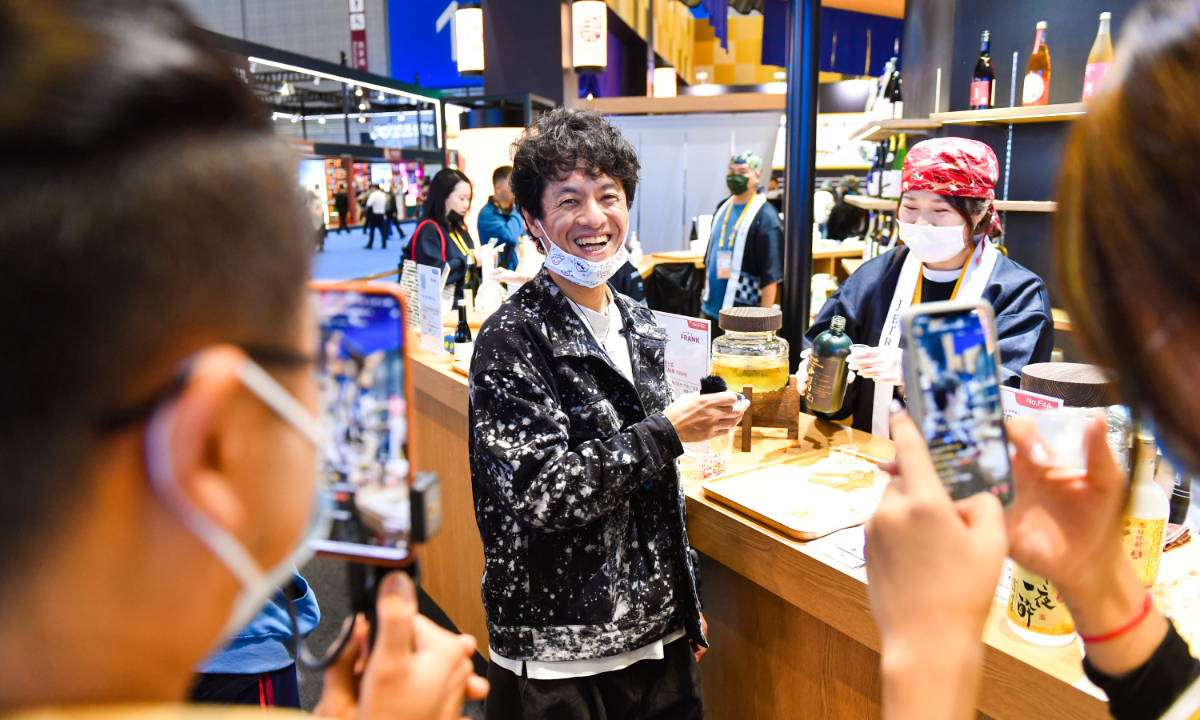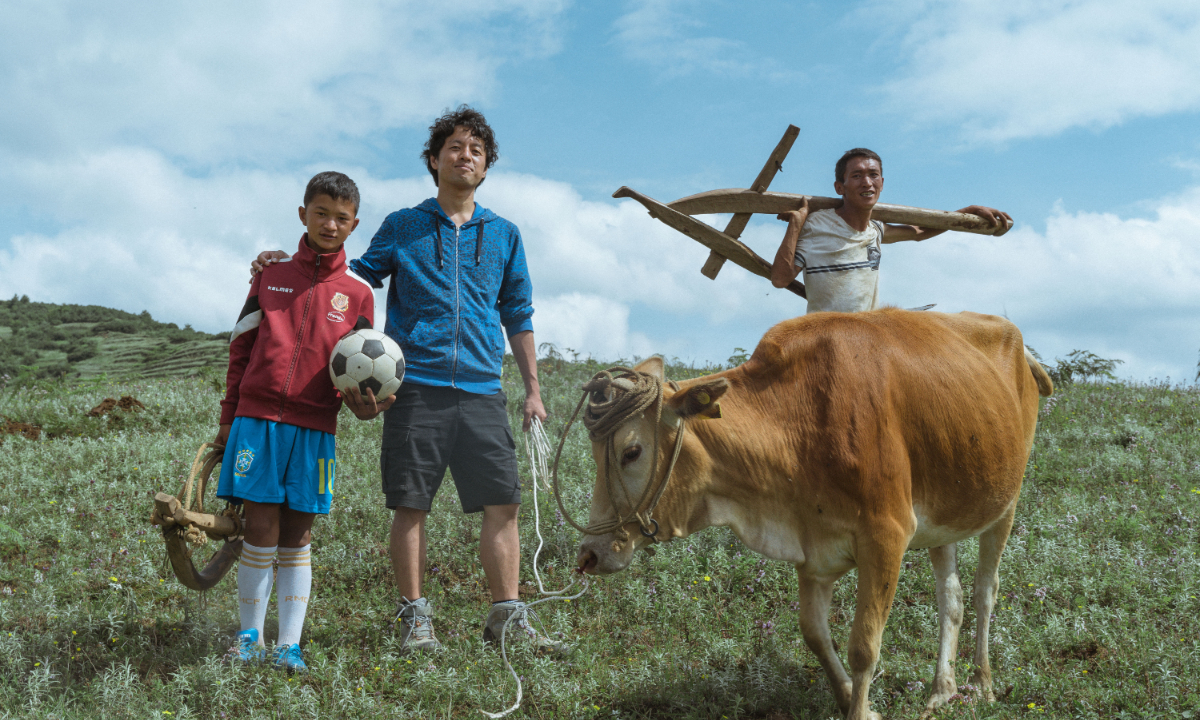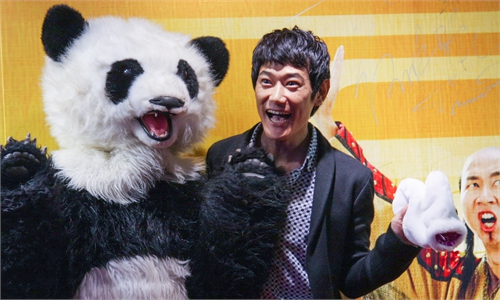IN-DEPTH / IN-DEPTH
Change of Yangtze in a decade: Japanese director shares remarkable China progress through lens on the river

Ryo Takeuchi livestreams at the Japan pavilion of the China International Import?Expo (CIIE) 2021 in Shanghai. Photo: VCG
Editor's Note:
China's modernization has been an epic journey over the past decades. Under the leadership of the Communist Party of China (CPC), China has become an attractive destination for many foreigners. Many such expats in the country have fulfilled their career aspirations, while some have found love and started families in China.
Why do they choose to live in China? How do expats in China view and interpret China's achievements and persistence measured from various perspectives?
The Global Times interviewed multiple international residents in China from all walks of life, some of whom have made tangible contributions to China's development, to learn about their understanding of the essence of Chinese culture, and gain an insight into how far China has advanced in its pursuit of development and rejuvenation over the last decade.
Why do you live here? Over the last decade, Japanese documentary director Ryo Takeuchi has been throwing the question to expats in China and Chinese nationals in Japan. As one of Takeuchi's representative works, The Reason I Live Here, which documents various stories in China, has continuously been updated over the years.
Born in 1978, Takeuchi came to China to shoot a documentary about mahjong when he was 23. Since 2013 when he moved to Nanjing, in East China's Jiangsu Province, a city which might not have looked too kindly on Japanese people for historical reasons, the Japanese director has since lived and built a family life in China for about a decade.
During the interview with the Global Times, Takeuchi didn't avoid the sensitive issue while noting the locals in Nanjing were quite friendly.
"I have never experienced unfair treatment in the city because of history."
While enjoying his life in China, the Japanese director also shared the real and varied stories of China to his home country and abroad through his camera lens.
As an expat with a Chinese permanent residence card, also known as Chinese "green card," he may be one of the most qualified expats to tell the story of the country's changes and development over the last decade.

Right: Ryo Takeuchi takes a picture with a local student from an elementary school in Liangshan Yi Autonomous Prefecture, Southwest China's Sichuan Province in July 2020. Photo: Courtesy of Takeuchi
Changes along the river
When the Global Times conducted an exclusive interview with Takeuchi, he had just returned from the Yangtze River basin. This was his second time shooting a documentary themed around the river.
"I travelled along the 6,300-kilometer-long Yangtze River again to capture the various local cultures. I started with the Qinghai-Xizang Plateau, and went downstream to record the lives of local people in Qinghai, Yunnan, Sichuan, Chongqing, Hunan, Hubei, Jiangxi, Anhui, Jiangsu, and Shanghai, so the audience can see the changes that have taken place in China in the last decade through one river," Takeuchi said.
The Yangtze River and its tributaries, connecting the inlands with the sea, have served as a bond between people from different regions in China. For millennia, it has nurtured local cultures along its route, from Southwest China's Sichuan and Chongqing to water towns in the Yangtze River Delta.
Back in 2011, Takeuchi filmed a Japanese NHK documentary on the Yangtze River. It was the first time he experienced one of the longest rivers in the world to ever flow entirely within one country when he and the NHK team followed the Chinese river from Qinghai and Sichuan to Shanghai.
Now after more than a decade when he returned with his camera lens, he noticed dramatic changes.
"The road and communication networks, and the accommodations are more convenient," Takeuchi said.
"In 2011 when I first shot a film along the river, it was troublesome and always took long to get to remote areas. Now with the expressways and airports having been constructed and more flights being launched, it's much easier to get anywhere."
The environment along the river has greatly improved thanks to more attention paid and efforts made in environmental protection, Takeuchi said.
"The water is clean. A decade ago, many rivers were really polluted because there used to be a lot of factories along the Yangtze River, and the factories discharged waste water into the river. But now such drainage is strictly prohibited and fishing is also restricted," he said.
A blueprint has been drawn for the Yangtze River Economic Belt to pursue green development and ecological conservation. "I hope that through the documentary, we can present a real China to the audiences at home and abroad, and at the same time, we hope that more people can pay attention to environmental protection through the Yangtze River, so that people residing along the river can enjoy a life of harmony with nature," the director said.
Takeuchi said that he had been to the Daliang Mountains, a poverty-stricken area in the Southwest China's Sichuan Province a decade ago when he was filming the Yangtze River documentary for NHK.
Back then, there was no highway in the Daliang Mountains and Takeuchi had to ride a donkey to traverse the terrain. The Japanese director's impression of the mountains was "poor."
"I was interested in how the local people managed to get out of absolute poverty in only 10 years." When he returned a decade later to film his documentary Beyond the Mountain, the life of the local residents had entirely been transformed.
Due to the country's determined efforts in poverty alleviation, the "cliff villages" have been relocated to more habitable places and the highway network now reaches every local village, Takeuchi said.
Most local residents now live in free resettlement housing provided by the government, he noted.
In the documentary Beyond the Mountain, there is a standard football field with a lawn repaired by the state in the local deep mountains. There is also a cooperation agreement with Real Madrid to train Chinese children to play football, which was unimaginable a decade ago.
Another development is that locals became more open-minded, according to the director. Takeuchi said "In the Daliang Mountains, residents used to marry someone of their parents' choosing, but it's free love now. This means people there have their own right to choose their partners and should take responsibilities for their choice."
More development and changes in China are far from being recorded through Takeuchi's camera lens, and this Japanese director is always on the road to discovering and telling more stories.
Previously, to encourage more talented Chinese and foreign filmmakers to join telling China's stories, a project to sponsor filmmakers and collect brilliant documentaries about China's stories in the new era, the Image Possibilities Coproduction Plan, was launched in Beijing in August.
Some experienced filmmakers, including Japanese director Takeuchi Ryo and Oscar-winning UK filmmaker Malcolm Clarke have been invited to join the project as consultants who will also provide advice and guidance to participants.
The project focuses on two categories of works, 21-minute documentaries and 10-minute short videos. The project will sponsor five documentaries and 10 short videos on themes given by the project, an employee working for the organizing committee for the project told the Global Times.
Following the program, there will also be diverse events such as creative workshops for Chinese and foreign directors, global exhibition ceremonies and the International Documentary Conference.
The poster for a 45-minute documentary that examines China's 2020 national college entrance exams, or gaokao, which Japanese director Takeuchi worked on, was also displayed at the exhibition.
In the documentary, Takeuchi focused his segment on exam volunteers in Nanjing, East China's Jiangsu Province, such as taxi drivers who volunteered to drive candidates to exam venues.


